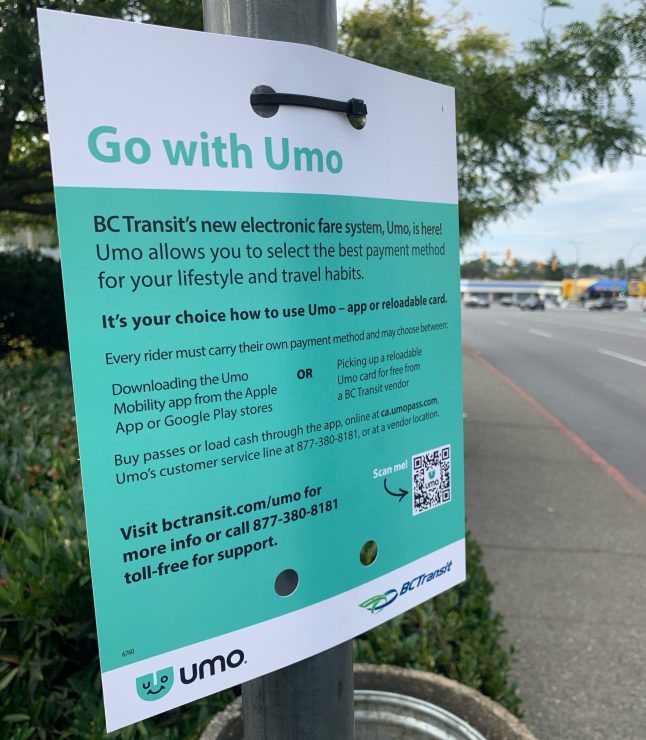With the rollout of Umo, some UVic students are reporting issues accessing key services

Photo by Hannah Link.
Not all UVic students can fully use the new transit payment system introduced on Sept.1.
Umo is a digital system that has replaced the OneCard as a bus pass for UVic students. In order to access their passes, students must activate the Umo app or a physical Umo card with a benefit code provided by the university as part of graduate and undergraduate tuition.
International students are reporting difficulties downloading the necessary app because of the default locations on their smartphones being set to countries other than Canada.
Rowan Ball is a fourth year linguistics major attending UVic as an international student from England. When she and her friends tried to get the Umo app, Ball found that not everyone could download it. She and another friend who is also an international student found out that they could not get the app unless their phones’ region was set to Canada.
Even after changing the region on her phone — a switch which can often affect communications and language settings — Ball is still unable to download Umo. She said that this is because her Apple ID is connected to her family’s back in Britain. According to the official Apple website, family sharing can affect the ability to fully change one’s location to a new country.
“It feels like a bit of an oversight to make us use a system that is straight up not accessible for international students,” she said. “It’s just a shame that they’re overlooking such a large portion of their student population.”
Ball did manage to activate a physical Umo card using her UPass code, but said that she would have appreciated clearer messaging from BC Transit or UVic about the international barrier when accessing the app. She is stuck using the card, but her peers are able to choose the option that best suits their preferences.
In addition to acting as a digital bus pass, the Umo app will offer live updates and route information that is otherwise only accessible through third party apps. As a result, it is BC Transit’s recommended option, as opposed to the card.
Ryan Dennis, the director of revenue development, explained that BC Transit implemented the physical Umo card as an option for those unable to use the app, such as international students.
According to Dennis, BC Transit has no plans to stop providing service information to other transit platforms, such as Google Maps, Apple Maps, and Transit.
He acknowledged that the transition to Umo will take some time. “Everyone is going to have their own experience with Umo,” said Dennis, adding later that “We recognize there are people who need some extra support in making the transition.”
According to Dennis, the Greater Victoria Regional Transit Commission is the first region in Canada to adopt the Umo system, which is widely used throughout the United States. BC Transit also plans to implement the system throughout the province in 29 other transit systems, starting with the Cowichan Valley.
“I’m really excited to see all of the UPass riders start using [Umo], and if there is any feedback, we’d obviously love to hear it,” said Dennis. He wants students to know that BC Transit has a customer call centre, where they can get help adding the benefit code to their cards or apps.
The Victoria Regional Transit System plans to phase-out the use of traditional swipe cards. They will decide on a timeline for this change after they’ve heard feedback from users about the introduction of Umo, said Dennis.
He also explained that the Umo app won’t be available to users from other countries unless the Umo system is tested and implemented in those specific regions.
Skyla Thomas, a third year political science student, lives off-campus and relies on the bus to navigate Victoria. She chose to activate her UPass benefit code on an Umo card, and said that the process was simple for her to follow. However, she feels there was a lack of communication about the change.
She also feels that the new card takes away from the purpose of having a OneCard. “I don’t think it should be called the ‘OneCard’ anymore,” said Thomas, explaining that the card has lost its appeal as a universal tool for students.
The Graduate Students’ Society (GSS) also expressed concerns about Umo in an email to the Martlet, saying they are disappointed with the new system.
“It has raised serious concerns among students, domestic and international,” reads the statement. “Requests for the card are significantly higher than anticipated, indicating that a move to the new system is not the preference of most students.”
In a joint statement with the UVic Students’ Society (UVSS), the GSS also provided more information about the transition to Umo. Despite concerns, both organizations say they are available to help students as they set up their new passes. “We are students ourselves, so we’re happy to give step-by-step tutorials of how we added our own UPASSes to our cards/apps!”
The UVSS and GSS also emphasized that their help desks are equipped with free Umo cards, and can provide support for students who have questions about the new system.







